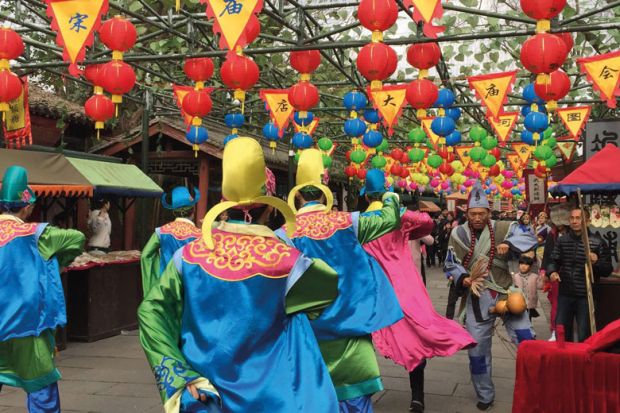China is increasingly looking to launch arts-focused campuses in partnership with Western universities, but the reluctance of some potential partners shows that concerns about collaborations with the Communist superpower stretch well beyond science and technology.
In the latest development, Wesleyan University, a US liberal arts college with a well-regarded film school, declined an invitation to open a joint venture university in China and the potential to work with a massive studio complex there.
This rejection will likely not stop the company behind the project from seeking another foreign partner as China continues to invest in soft power industries such as art, culture, cinema and theatre.
Hengdian Group, a privately held investment holding giant, has reportedly already secured the space for the campus in Zhejiang province near Hengdian World Studios, which calls itself “the world’s largest film and TV shooting base”. The campus would have come at no or little cost to the US college, according to The Wesleyan Argus campus newspaper.
Michael Roth, Wesleyan’s president, confirmed that “further conversations with those who proposed the partnership have made it clear that our respective goals could not be sufficiently aligned – not to mention the questions we had around issues of academic freedom and the implications for our home campus”.
There are more than 1,000 foreign collaborations in Chinese higher education, but joint venture universities are at the top of the pyramid. There are only nine such joint ventures in China, not yet counting the Tianjian Juilliard School, a music conservatory that will open fully in 2020. The Hengdian campus, at least as planned, would be a venture on this level.
Mike Gow, a lecturer in Coventry University’s School of Strategy and Leadership, told Times Higher Education that “cultural industries are at the forefront of development concerns for authorities”.
Dr Gow previously held posts at two Chinese joint ventures: NYU Shanghai, an outpost of New York University, and Xi’an Jiaotong-Liverpool University.
“Just as we’ve seen the earlier 1997-2003 period focus on STEM and business, we’re now seeing Sino-foreign collaborations relevant to state development objectives – film, TV, arts, cultural industries and creative digital industries,” Dr Gow said.
Although the arts might be a less controversial subject area amid US-China tensions over trade and technology, even seemingly innocuous cultural exchanges are not exempt from politics.
The Eastman Philharmonia, a renowned student performance group from the University of Rochester, recently cancelled a tour of China. According to a letter by Jamal Rossi, dean of the Eastman School of Music, one consideration was that “South Korean members of the Philharmonia would not be able to obtain required work visas in China because of a diplomatic matter”.
Separately, the London School of Economics was reported to have put on hold a proposed programme focusing on Chinese economics, politics and society amid opposition from academics. Research and new degrees would have been funded by Eric Li, a Shanghai businessman who has regularly praised President Xi Jinping and has previously justified the 1989 crackdown on the Tiananmen Square protests, The Financial Times reported.
Register to continue
Why register?
- Registration is free and only takes a moment
- Once registered, you can read 3 articles a month
- Sign up for our newsletter
Subscribe
Or subscribe for unlimited access to:
- Unlimited access to news, views, insights & reviews
- Digital editions
- Digital access to THE’s university and college rankings analysis
Already registered or a current subscriber? Login








